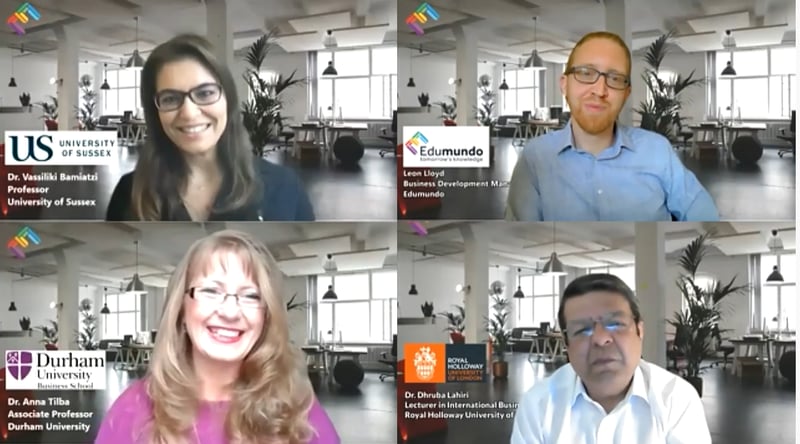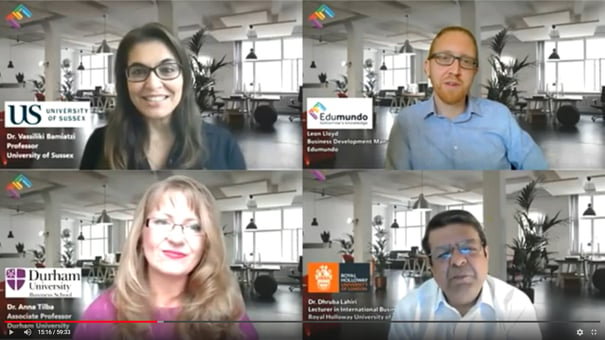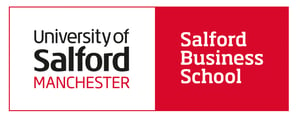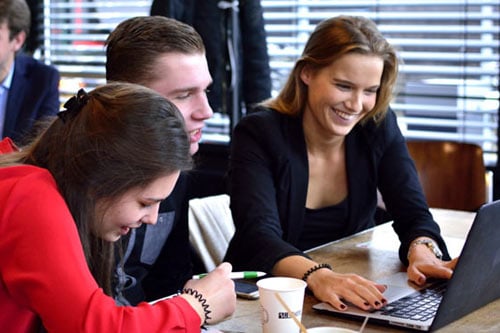"For me, student engagement is active learning." Dr. Vassilliki Bamiatzi
On Tuesday 25th May, we hosted a webinar to discuss the topic of student engagement with an emphasis on experiential learning through management simulations.
With over 50 attendees we were joined by our guest speakers: Dr. Anna Tilba from Durham University, Prof. Vassiliki Bamiatzi from University of Sussex and Dr. Dhruba Lahiri from Royal Holloway University of London.
In this post, we recap on the approaches of our guest speakers, covering the key themes of:
- Defining student engagement
- Case studies and management simulations
- The competitive simulation environment
- Role Delegation/personality traits
- Module assessment
Student engagement - what do we mean?
Here, we're talking about student engagement within students' courses of study and not referring to a broader sense of student engagement within a wider student community/body.
We're looking at the pedagogical approaches to motivate or incentivise students to become engaged with course/module content.
One approach is using experiential learning techniques and in the case of management simulations, devolving instruction to the student.
"Usually, students tell me: 'I thought engagement was about showing up at a lecture, sitting there, being present or it was about going to our online learning platforms.'" Dr. Anna Tilba
Student-led learning
The panel reflected on the use of case studies in comparison to management simulations but identified a key benefit of management simulations: its ability to foster student-led learning.
"It's putting students into the shoes of managers, and taking accountability of their decisions," Vassiliki explained "...they can see how these decisions are affecting the performance of the company, in relation to the rest of the competition."
Another identified way of incentivising student engagement and student-led learning is to enable students to strengths and weaknesses in their own knowledge of a subject.
"The simulation brings everything to life. It inter-links different subjects, exposes students to what they don’t know about managing a business and highlights any gaps in their knowledge.”
Dr. Dhruba Lahiri
Becoming Case Studies
A very popular approach across many disciplines is the utilisation of case study assignments. Here, students are tested on their ability to analyse and evaluate a real-life scenario rather than focus solely on learning concepts and theories. This emphasis of real-life exposure is a key factor in management simulations. Vassiliki pointed out:
"Many use case studies but they’re not as engaging because students cannot grasp all of the information nor how they interpret the case. In simulations, students have this accessibility.”
But, perhaps there isn't a divide between case studies and management simulations. Maybe the former becomes the latter, where students' companies in the simulation become case studies themselves, that students then use for future analysis. As our host Leon Lloyd, highlighted:
"Case studies are a great way of getting students to think about a theoretical framework. The problem is students haven't been part of that case study. The simulation gives them ownership of that; they're actually in a case study."
"Students realise how different the experience of active learning is, and being involved in making their own case studies." Dr. Anna Tilba
Competitive environment – a motivator or demotivator?
One participant asked a key question about the competitive environment of management simulations and whether this hindered students’ engagement with them. This was Anna’s take on this:
“We’re trying to train and prepare students for the real world. In the real world we have to work with different people…it’s also a journey for students to learn more about who they are. Are they leaders or good team players? Those who are not as competitive could be really good at other areas such as data analysis and finance.”
Personality Traits > Role Delegation
This question led nicely on to another theme discussed within the panel: team dynamics and how personality traits feature in students' roles within the teams.
“I provide students with a role-making task in the beginning to see what personality traits they have and they decide upon their role within the simulation accordingly.”
Dr. Vassiliki Bamiatzi
Organisations In Context
Another advantage identified by the panel is how management simulations can highlight the remits and accountabilities of various departments within a business and how each one has to work together to improve company performance. Here's Anna's take on this:
"There's a beautiful ability of the simulation in putting organisations in context," talking about the structure of degree programmes Anna explained: "...there's a module on strategy, a module on human resources, a module marketing and they're all separate and compartmentalised...but when students operate the simulation they get the sense of how these different parts work within the business."
Assessment - performance or reflection
The panel also explored how the simulation is assessed on their modules. Anna explained:
“I don’t judge them on the basis of their performance but on what students learn. Students who do really badly [on the simulation] still write top-class assignments. I assess students on their reflection of understanding, in connecting theory to practice.”
It’s a similar approach for Dhruba and Vassiliki, but with both utilising group assignments as well as individual reports.
“I tell students I am not interested in what results you achieved [in the simulation], what I want you to answer in the report is why you achieved those results: what did you do right and what did you do wrong.” Dr. Dhruba Lahiri
Recap and Q&A Session
The webinar culminated with a lively ‘Recap and Q&A’ session. As one participant remarked:
“That was really interesting. It's been really helpful in terms of assessment. I wonder if it is possible to create a community or discussion board for educators using the Edumundo simulations so we can share ideas?”
This idea has since been followed-up whilst many participants are now exploring the use of management simulations in their modules.
Overall, a highly interesting and informative session thanks to the contributions of all in attendance on the day.
Did you miss the webinar? Don't worry...
Click here to view a recording of it.



.png?length=300&name=unnamed%20(11).png)
.png?length=300&name=unnamed%20(7).png)
.png?length=300&name=unnamed%20(8).png)
.png?length=300&name=unnamed%20(6).png)

.png?length=300&name=unnamed%20(10).png)
.png?length=300&name=unnamed%20(5).png)
.png?length=300&name=unnamed%20(9).png)
.png?length=300&name=unnamed%20(4).png)
.png?length=300&name=unnamed%20(2).png)
.png?length=300&name=unnamed%20(1).png)
.png?length=300&name=unnamed%20(3).png)
.jpg?length=300&name=unnamed%20(2).jpg)





.png?length=300&name=loughborough-university-logo%20(small).png)





